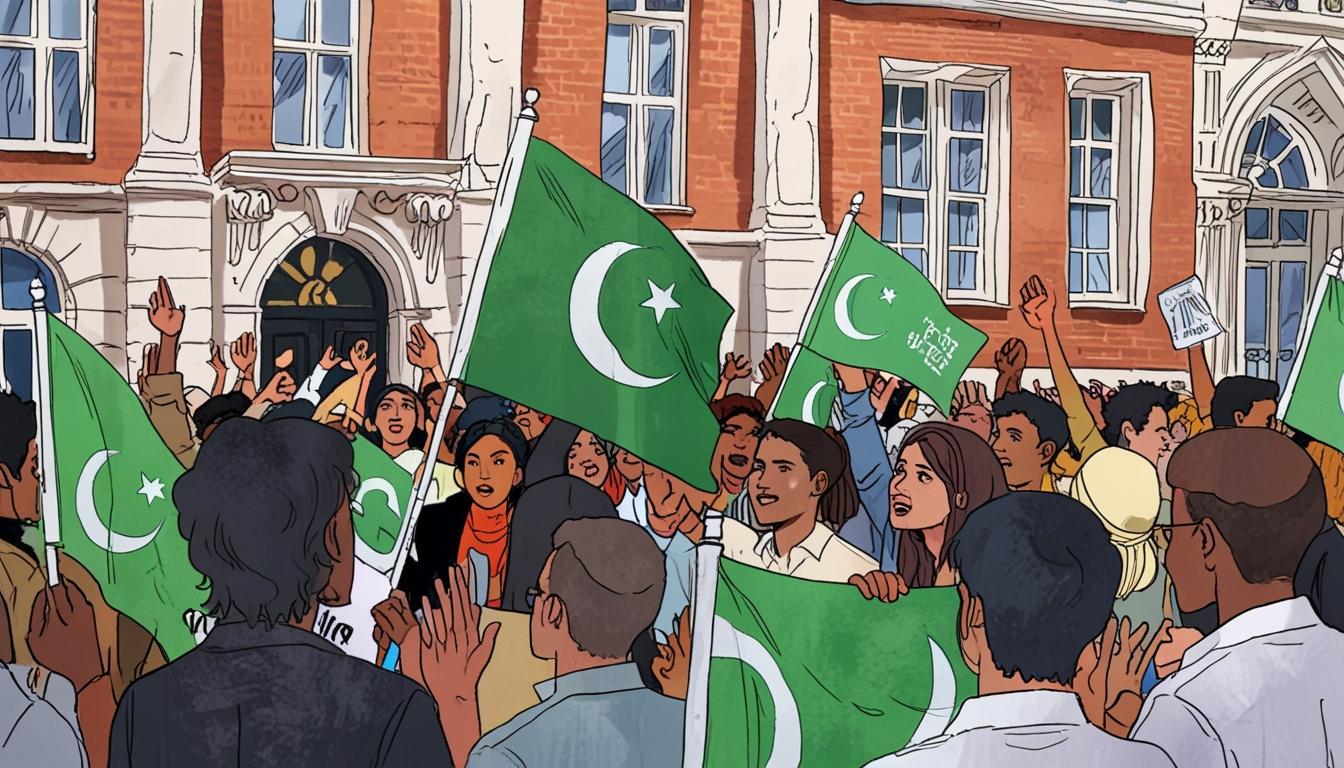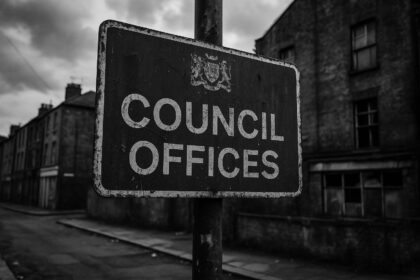Hundreds rallied outside the Indian High Commission in London to protest recent Indian airstrikes in Pakistani Kashmir, which have left dozens dead and intensified fears of escalation between the nuclear-armed neighbours.
Tensions Rise as Protesters Rally Against India’s Airstrikes
On 7 May 2025, a significant protest unfolded outside the Indian High Commission in London, drawing attention to the escalating violence in Kashmir. Demonstrators, waving Pakistan flags, chanted slogans such as “we want peace” and “long live Pakistan” in response to India’s recent missile strikes in Pakistani-administered Kashmir. The Pakistani military reported that these strikes resulted in the deaths of 31 individuals, alongside injuries to dozens more and the destruction of a local mosque.
India, on its part, claimed that its military action was a necessary response to ongoing hostilities, citing 15 fatalities among its citizens due to heavy Pakistani shelling along the Line of Control, the de facto border dividing the two territories of Kashmir. The strikes are part of a protracted history of conflict between the two nations, with both sides accusing each other of instigating violence.
The recent airstrikes form part of Operation Sindoor, which India initiated following a terrorist attack in Pahalgam, Kashmir, that resulted in the deaths of 28 civilians, predominantly Hindu tourists. While India touted the operation as a strike against militant infrastructure linked to groups like Lashkar-e-Taiba and Jaish-e-Mohammed, the human cost has raised international alarms regarding the implications of military aggression between these two nuclear-armed countries.
Protests surrounding Kashmir are not new; instances of civil unrest have often been inflamed by political incidents. Just weeks prior, an earlier protest in London turned chaotic when a Pakistani diplomat made alarming throat-slitting gestures toward Indian protesters, reflecting the deep-seated animosities between the communities. Reports indicate that this incident exacerbated tensions, with organisations from the Indian community expressing outrage and demanding accountability.
Amidst these protests, the international perspective on India-Pakistan relations remains cautious, particularly under the current leadership of Prime Minister Narendra Modi. A US intelligence assessment has highlighted concerns about potentially aggressive military responses by India to any perceived threats from Pakistan, warning of an ongoing cycle of escalation that threatens to destabilise the region further.
The ongoing conflict in Kashmir continues to capture global attention, with diplomatic efforts being made to address the long-standing issues between the two nations. However, the recent events in London are a poignant reminder that the socio-political stakes are not just confined to South Asia; they echo throughout diaspora communities across the world, holding the potential for significant unrest.
As the situation evolves, the call for peace, as echoed by protesters in London, may become increasingly vital in the broader quest for stability in a region fraught with tension and historical grievances.
Source: Noah Wire Services
- https://www.independent.co.uk/tv/news/strikes-india-pakistan-protest-london-video-b2746898.html – Please view link – unable to able to access data
- https://www.independent.co.uk/tv/news/strikes-india-pakistan-protest-london-video-b2746898.html – On May 7, 2025, protesters gathered outside the Indian High Commission in London to demonstrate against India’s missile strikes in Pakistani-administered Kashmir. The demonstrators, holding Pakistan flags, chanted ‘we want peace’ and ‘long live Pakistan.’ The Pakistani military reported that 31 people were killed in India’s airstrikes, including the destruction of a mosque, with dozens more injured. In response, India stated that 15 of its citizens were killed due to heavy Pakistani shelling along the Line of Control, the de facto border between the two parts of Kashmir administered by India and Pakistan.
- https://www.newindianexpress.com/world/2025/Apr/26/pahalgam-attack-protest-turns-tense-in-london-pak-diplomat-makes-throat-slitting-gesture-at-indians-2551237.html – On April 25, 2025, a protest in London against Pakistan-backed terrorism turned tense when a Pakistani diplomat made a throat-slitting gesture towards Indian protesters. The demonstration was in response to the Pahalgam terrorist attack, which killed 26 people in Kashmir. The Pakistani official taunted protesters from the balcony of the mission building, holding a poster of Indian Air Force pilot Abhinandan Varthaman and making threatening gestures. The incident led to heightened tensions and condemnation from Indian community groups.
- https://en.wikipedia.org/wiki/2025_India%E2%80%93Pakistan_strikes – The 2025 India–Pakistan strikes refer to a series of military actions that began on May 7, 2025, when India conducted missile strikes on Pakistan and Pakistani-administered Jammu and Kashmir, codenamed Operation Sindoor. India claimed to target terrorist infrastructure of Lashkar-e-Taiba and Jaish-e-Mohammed, while Pakistan reported civilian casualties and damage to infrastructure. The strikes were in response to a terrorist attack in Pahalgam, Kashmir, which killed 28 civilians, mostly Hindu tourists. The conflict has led to significant casualties and heightened tensions between the two nuclear-armed nations.
- https://en.wikipedia.org/wiki/India%E2%80%93Pakistan_relations – India–Pakistan relations have been marked by periods of tension and conflict, particularly over the Kashmir region. The 2025 India–Pakistan standoff, which began in April 2025, escalated with India’s missile strikes on Pakistan and Pakistani-administered Kashmir in May 2025. The conflict has led to casualties on both sides and has drawn international concern due to the potential for further escalation between the two nuclear-armed nations. Diplomatic efforts are ongoing to de-escalate the situation and address the underlying issues contributing to the conflict.
- https://www.livemint.com/news/india/another-india-pakistan-war-high-possibility-of-military-retaliation-in-kashmir-under-modi-s-leadership-says-us-intel-11678346596143.html – A US intelligence report has raised concerns about the possibility of India retaliating against Pakistan in the event of a terror attack on India or orchestrated ‘violent unrest in Kashmir’ by extremist groups based in Pakistan. The report highlights a higher probability of India responding with military force under the leadership of Prime Minister Narendra Modi to perceived or real Pakistani provocations. This assessment underscores the risk of an ‘escalatory cycle between two nuclear-armed states’ and the potential for conflict in the region.
- https://www.businesstoday.in/latest/world/story/thousands-waving-pakistani-kashmiri-flags-protest-outside-indian-high-commission-britain-222113-2019-08-16 – In August 2019, thousands of protesters gathered outside the Indian High Commission in London, waving Pakistani and Kashmiri flags, to demonstrate against India’s decision to revoke the special status of Jammu and Kashmir. Protesters carried banners reading ‘Kashmir is Burning,’ ‘Free Kashmir,’ and ‘Modi: Make Tea Not War.’ The demonstration was in response to India’s revocation of Article 370, which granted special autonomy to Jammu and Kashmir, leading to heightened tensions and international concern over the region’s future.
Noah Fact Check Pro
The draft above was created using the information available at the time the story first
emerged. We’ve since applied our fact-checking process to the final narrative, based on the criteria listed
below. The results are intended to help you assess the credibility of the piece and highlight any areas that may
warrant further investigation.
Freshness check
Score:
10
Notes:
The narrative mentions recent events, specifically the protest on 7 May 2025, indicating that the information is current and up-to-date.
Quotes check
Score:
0
Notes:
There are no direct quotes in the narrative to verify.
Source reliability
Score:
9
Notes:
The narrative originates from ‘The Independent’, a well-known reputable publication with a strong reputation for credible reporting.
Plausability check
Score:
9
Notes:
The claims are plausible given the ongoing conflict between India and Pakistan and recent protests in London, aligning with historical tensions and geopolitical realities.
Overall assessment
Verdict (FAIL, OPEN, PASS): PASS
Confidence (LOW, MEDIUM, HIGH): HIGH
Summary:
The narrative appears current, reliable, and plausible, based on recent events and publication in a reputable outlet.













